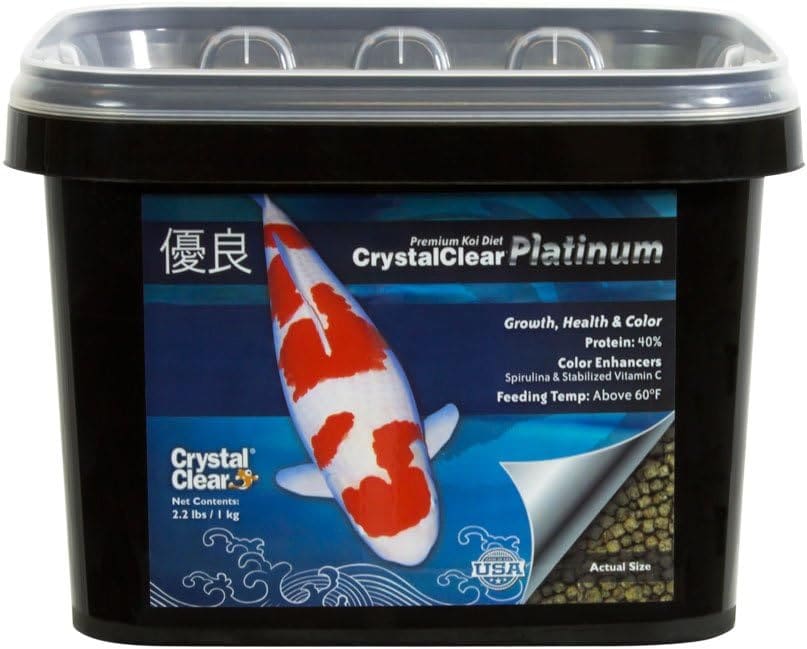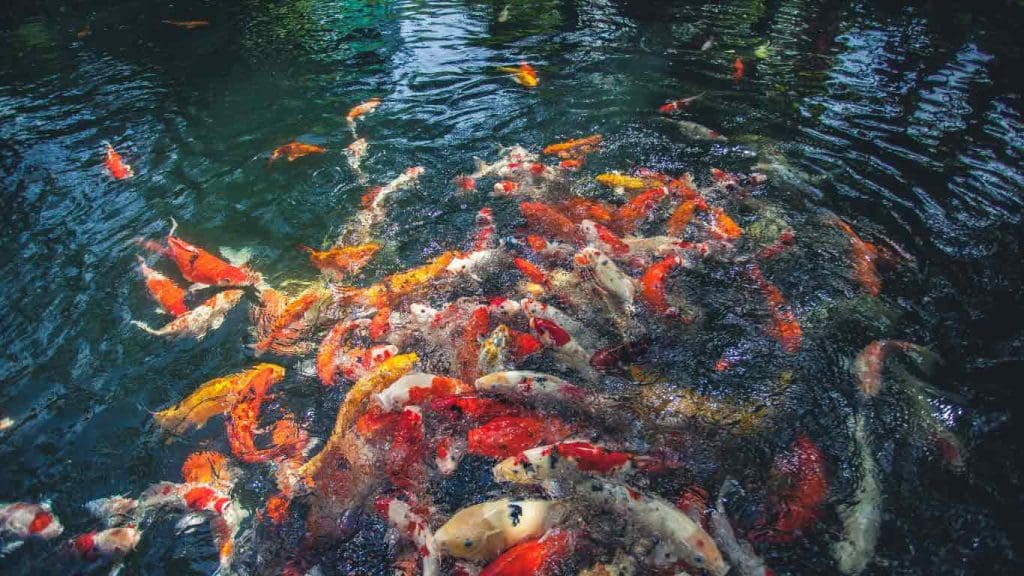Koi fish are a popular addition to backyard ponds, but many pond owners wonder if they are actually good for their ponds. In this article, we will explore the benefits and drawbacks of keeping koi in a pond.
One of the benefits of having koi fish in your pond is that they can help keep the water clean. Koi are known for their ability to eat algae and other debris, which can improve the overall water quality. Additionally, many people find that watching koi swim in their pond can be a source of enjoyment and relaxation.
However, there are also some drawbacks to consider when it comes to keeping koi in a pond. For example, koi can be messy fish, which means that pond owners will need to regularly maintain the water quality. Additionally, koi can grow quite large, which means that they may not be suitable for smaller ponds. Overall, whether or not koi are good for your pond will depend on a variety of factors, including the size of your pond and your personal preferences.
Are Koi Fish Good for Ponds? Here are Your Answers-
After researching and considering the benefits and drawbacks of keeping koi fish in ponds, we have come to the following Answers and Suggestions:
Overall, while there are some drawbacks to keeping koi in a pond, the benefits can outweigh them if proper care and maintenance are provided. As with any pet or addition to a home, it is important to carefully consider all factors before making a decision.


The Basics of Koi Fish
Koi fish are a popular choice for ponds due to their stunning colors and peaceful nature. They are a type of carp that originated in Japan and have been selectively bred for over 200 years to achieve their distinctive patterns and colors.
Koi fish can grow quite large, with some reaching up to three feet in length. They require a lot of space to swim, so it’s important to have a pond that is at least 250 gallons per fish. Large breeding females may require up to 500 gallons per fish.
Koi fish are omnivores and will eat a variety of foods, including pellets, flakes, and live food like worms and insects. It’s important to feed them a balanced diet to keep them healthy.
One thing to keep in mind is that koi fish can be messy and produce a lot of waste, so a good filtration system is essential to maintain good water quality. Aeration is also important to ensure that there is enough oxygen in the water for the fish to breathe.
Overall, koi fish can be a great addition to a pond as long as you are prepared to provide them with the space and care they need to thrive.
Benefits of Koi Fish in Ponds
Koi fish are a popular addition to backyard ponds, and for good reason. They offer a variety of benefits that can enhance the overall health and appearance of your pond. In this section, we will discuss the benefits of koi fish in ponds, including aesthetic appeal, ecosystem balance, and pest control.
Aesthetic Appeal
One of the most obvious benefits of having koi fish in your pond is their aesthetic appeal. Koi fish are known for their vibrant colors and patterns, which can add life and beauty to your pond. They are also fascinating to watch as they swim gracefully through the water. In addition, koi fish can grow quite large, which can be impressive to see in a backyard pond.
Ecosystem Balance
Koi fish can also help to balance the ecosystem of your pond. They are omnivorous, meaning they eat both plants and animals. This can help to control the population of algae and other unwanted aquatic plants, which can improve water quality and clarity. In addition, koi fish produce waste that can fertilize the plants in your pond, which can help them to grow and thrive.


Pest Control
Koi fish can also help to control pests in your pond. They are known to eat mosquito larvae, which can help to reduce the population of these annoying and potentially dangerous insects. In addition, koi fish can help to control the population of other unwanted pests, such as snails and slugs.
Overall, there are many benefits to having koi fish in your pond. They offer aesthetic appeal, help to balance the ecosystem, and can even provide pest control. However, it is important to remember that koi fish require proper care and maintenance to thrive in a pond environment.
Considerations Before Adding Koi to Ponds
Pond Size
When considering adding koi to a pond, the size of the pond is an important factor to take into account. Koi can grow quite large, and they need a lot of space to thrive. A general rule of thumb is to have at least 250 gallons of water for every adult koi. So, if you plan on having multiple koi, you will need a large pond.
Maintenance Requirements
Koi require a certain level of maintenance to keep them healthy and happy. They produce a lot of waste, so a good filtration system is essential. Regular water changes are also necessary to keep the water quality in check. Furthermore, koi need a varied diet, and their food should be high in protein.
Climate Factors
Koi are cold-water fish and can survive in a wide range of temperatures. However, extreme temperatures can be harmful to them. If you live in an area with very hot summers or very cold winters, you may need to take additional measures to ensure your koi’s survival. For example, you may need to install a heater to keep the water temperature stable during the winter months.
In brief, adding koi to a pond can be a rewarding experience, but it requires careful consideration. The size of the pond, maintenance requirements, and climate factors are all important factors to keep in mind. By taking these factors into account, we can create a healthy and happy environment for our koi to thrive in.


Rapid Growth Koi Fish Food With Added Vitamins & Spirulina
Potential Challenges with Koi Fish in Ponds
Koi fish are generally considered to be good for ponds and can provide a source of enjoyment for pond owners. However, there are some potential challenges that come with keeping koi in ponds.
Disease Management
One of the biggest challenges of keeping koi in ponds is disease management. Koi are susceptible to a variety of diseases, including bacterial, viral, and parasitic infections. These diseases can be introduced to the pond through new fish, contaminated water, or even wild birds.
To prevent disease outbreaks, it is important to maintain good water quality and to quarantine new fish before introducing them to the pond. Regular water testing, cleaning, and maintenance are also essential. If a disease outbreak does occur, prompt treatment is necessary to prevent the spread of the disease to other fish in the pond.
Predator Threats
Another potential challenge of keeping koi in ponds is predator threats. Koi are attractive prey for a variety of predators, including birds, raccoons, and even cats. A predator can quickly decimate a pond population, so it is important to take steps to deter predators from the pond.
Some effective predator deterrents include:
- Installing a fence or netting around the pond
- Adding motion-activated lights or sprinklers
- Using decoys or scare devices
By taking steps to manage disease and deter predators, we can help ensure the health and safety of our koi fish in ponds.


JOIN OUR COMMUNITY AND GET A FREE E-BOOK
FInal Remarks
In brief, koi fish can be a great addition to a pond if certain conditions are met. As we have discussed throughout this article, it is important to have a pond that is large enough to accommodate their growth and a proper filtration system to maintain water quality.
It is also important to note that having koi fish in your pond requires regular maintenance, including testing the water, changing out some water as needed, and cleaning filters frequently. While koi can help keep the water clean, they can also be messy fish, so it is important to be prepared for the additional work and expenses that come with keeping them.
Overall, if you are willing to put in the effort and resources necessary to properly care for koi fish, they can be a beautiful and interesting addition to your pond. However, if you are not prepared to meet their needs, it may be best to consider other types of fish or aquatic plants for your pond.
Frequently Asked Questions
What size pond is suitable for keeping koi fish?
The size of the pond suitable for keeping koi fish depends on the number of fish you want to keep. A school of large koi will require up to 1,000 gallons of water. The rule of thumb with these fish is to keep 10 gallons of water for every inch of fully grown koi. This means that you will need 250 gallons of water for one adult fish.
Where can I buy koi fish for my pond?
You can buy koi fish from reputable dealers, pet stores, or online retailers. It is important to buy koi fish from a reliable source to ensure that you get healthy fish.
What other types of fish can survive winter in a pond?
Besides koi fish, goldfish, and catfish can also survive winter in a pond. These fish are hardy and can tolerate cold temperatures.
Can koi fish thrive in a natural pond environment?
Koi fish can thrive in a natural pond environment as long as the pond meets their requirements. Koi require clean water, adequate oxygen levels, and a suitable temperature range.
What is the minimum pond size required for koi fish?
The minimum pond size required for koi fish is 250 gallons of water for one adult fish. A larger pond is recommended for a school of koi fish.
Do koi fish help to keep ponds clean?
Koi fish can help to keep ponds clean by eating algae and other aquatic plants. However, they also produce waste that can contribute to the buildup of organic matter in the pond. It is important to maintain a proper balance to keep the pond clean and healthy.
 1 (509) 228-8646
1 (509) 228-8646



